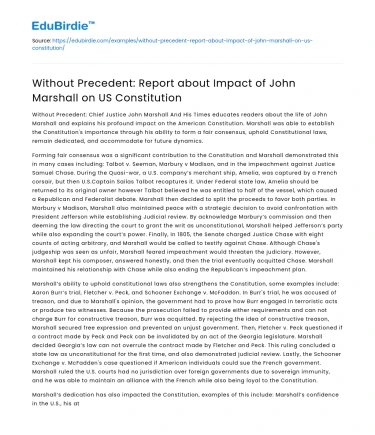Without Precedent: Chief Justice John Marshall And His Times educates readers about the life of John Marshall and explains his profound impact on the American Constitution. Marshall was able to establish the Constitution's importance through his ability to form a fair consensus, uphold Constitutional laws, remain dedicated, and accommodate for future dynamics.
Forming fair consensus was a significant contribution to the Constitution and Marshall demonstrated this in many cases including: Talbot v. Seeman, Marbury v Madison, and in the impeachment against Justice Samuel Chase. During the Quasi-war, a U.S. company’s merchant ship, Amelia, was captured by a French corsair, but then U.S.Captain Sailas Talbot recaptures it. Under Federal state law, Amelia should be returned to its original owner however Talbot believed he was entitled to half of the vessel, which caused a Republican and Federalist debate. Marshall then decided to split the proceeds to favor both parties. In Marbury v Madison, Marshall also maintained peace with a strategic decision to avoid confrontation with President Jefferson while establishing Judicial review. By acknowledge Marbury’s commission and then deeming the law directing the court to grant the writ as unconstitutional, Marshall helped Jefferson’s party while also expanding the court’s power. Finally, in 1805, the Senate charged Justice Chase with eight counts of acting arbitrary, and Marshall would be called to testify against Chase. Although Chase's judgeship was seen as unfair, Marshall feared impeachment would threaten the judiciary. However, Marshall kept his composer, answered honestly, and then the trial eventually acquitted Chase. Marshall maintained his relationship with Chase while also ending the Republican’s impeachment plan.
Save your time!
We can take care of your essay
- Proper editing and formatting
- Free revision, title page, and bibliography
- Flexible prices and money-back guarantee
Marshall’s ability to uphold constitutional laws also strengthens the Constitution, some examples include: Aaron Burr’s trial, Fletcher v. Peck, and Schooner Exchange v. McFaddon. In Burr's trial, he was accused of treason, and due to Marshall's opinion, the government had to prove how Burr engaged in terroristic acts or produce two witnesses. Because the prosecution failed to provide either requirements and can not charge Burr for constructive treason, Burr was acquitted. By rejecting the idea of constructive treason, Marshall secured free expression and prevented an unjust government. Then, Fletcher v. Peck questioned if a contract made by Peck and Peck can be invalidated by an act of the Georgia legislature. Marshall decided Georgia’s law can not overrule the contract made by Fletcher and Peck. This ruling concluded a state law as unconstitutional for the first time, and also demonstrated judicial review. Lastly, the Schooner Exchange v. McFadden's case questioned if American individuals could sue the French government. Marshall ruled the U.S. courts had no jurisdiction over foreign governments due to sovereign immunity, and he was able to maintain an alliance with the French while also being loyal to the Constitution.
Marshall’s dedication has also impacted the Constitution, examples of this include: Marshall’s confidence in the U.S., his attitude towards friends and family, and in Cohens v. Virginia. During the war of 1812, the British troops burned the capital, the president’s house, and the treasury building. Once this event was published, Marshall was devastated to see the buildings in ruin. Marshall viewed this war unnecessary, and the destruction of Washington as a tragedy, however, he remained confident in his country. This event left an impression with Marshall that motivated him to create a strong nation. Marshall was also devoted to his neighbors and his wife Polly as he was with his cases. Even when he was considered a celebrity, his devotion to the people around him never diminished, and this showed Marshall as a committed individual. Lastly, Cohens v. Virginia examined if the Supreme Court’s power to review a state court’s decision. Marshall demonstrated the superiority and power over state courts by extending the Supreme Court’s jurisdiction over Cohens v. Virginia. By forbidding states to nullify federal laws, this proved Marshall’s devotion to improving the Constitution.
Lastly, Marshall accommodated future dynamics and examples includes: Antelope, Gibbons v. Ogden and Dartmouth College. Antelope questioned the international slave trade and debated the ownership of a group of Africans kidnapped by European slave traders who were also rescued by the U.S. Navy. The Supreme Court then dismissed Portugal’s claim to the slaves, gave 39 slaves to Spain, and “freed” the remaining 149 but also deported them to a colony in Liberia. Although Marshall despised slavery, the future of foreign affairs and conflicting with European powers influenced his decision. Gibbons v. Ogden debated Congress’ ability to regulate navigation and if they could take over a state’s waterway authority. Marshall decided congress has the power to regulate interstate and coastal trade, therefore, empowering the future of the federal government by expanding Congress’ power under the Commerce Clause to regulate economic growth. Lastly, at Dartmouth College, it was debated if New Hampshire legislator could make a private college into a public university. The college trustees then sued the college treasure who favored this change, and Marshall eventually ruled this state law a violation of the Constitution’s protection of contracts. Marshall’s decision recognized corporate charters as contracts and corporations as private persons also protected by the Constitution.
In conclusion, Marshall impacted the Constitution in many ways to create a powerful nation that is today. He is an American leader, a dynamic man, and an honest individual.






 Stuck on your essay?
Stuck on your essay?

